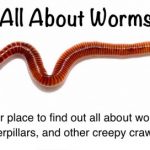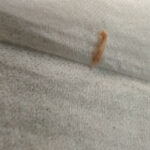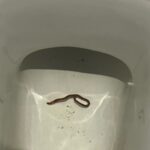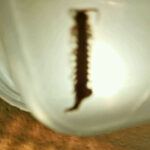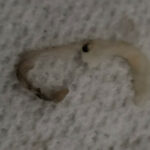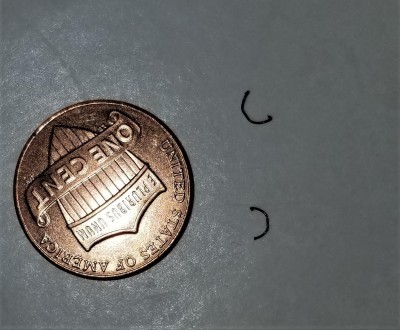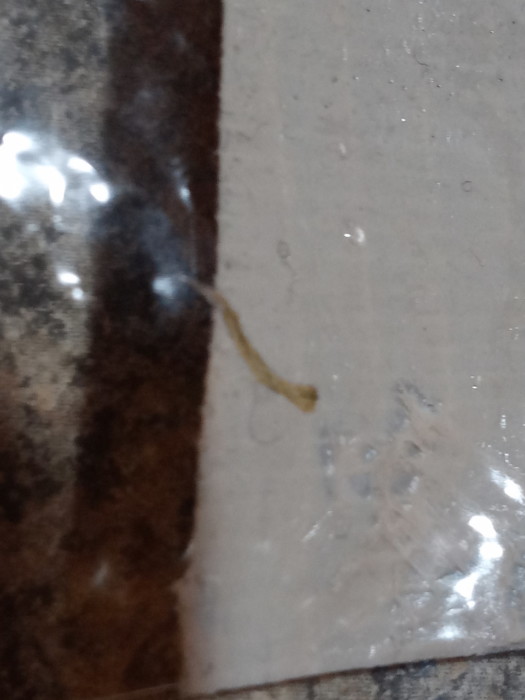
“I keep finding what looks to be small worms” states this reader, who is worried about the organisms in the photos below. In her submission, our reader brings up bed bugs, flatworms, and roundworms, so we will address all of these in this article.
To begin with, we need to make it clear that we will not be able to answer any questions related to our reader’s health, nor will we be able to identify any organisms that seem to be affecting our reader’s health. This is because, as the situation relates to her health, it is medical in nature, and as we are not medical professionals, we are not qualified to give out that kind of information. What we can do is answer our reader’s final question, “what should I do?” We can and will give her advice on who she can contact that will be qualified to identify, and thereby diagnose, our reader’s potential issue.
Before we do that, we still think it is important to lay bare the context our reader provided us. The “small worms” that our reader keeps finding feel like “glass” when she steps on them as she walks through her apartment. This is even after she has done a “VERY thorough cleaning” of her home.
“I couldn’t find anything until I swept the area (after already mopping it three times)” our reader reports; this piece of information is vital. It tells us that these organisms have not entered due to a build-up of organic debris or other materials. One of the things we always recommend that our readers do when they are experiencing an infestation is keep up a consistent cleaning-regime, but it seems that our reader already has this down, and so that is not the problem.
“What I saw in my dustpan threw me into a major panic attack” our reader continues. She used Google Lens to try to figure out what the creatures were, and every article she found told that the worms were hammerhead flatworms.
Additionally, the apartment our reader lives in had a “BAD infestation” of bed bugs at some point; our reader has recently been cleaning up dead bugs and black spots all over her apartment, and she suspects the black dots might be bed bug droppings (which we can see in the photograph below). “They were all on the same tile of my living room floor beside a bag of clothes I had just set there to dispose of.”
In conjunction with the worms, dead bugs and black dots she has found, our reader has also been experiencing symptoms of some kind. While she has not seen a “live” bed bug, she has been waking up with bites. She also thinks she has an intestinal parasite “as it feels like something is always crawling around on [her legs, butt cheeks” and that “something is coming out of [her] rectum”, especially when she is on the toilet. She asks if she could possibly have roundworms, and what she can do to get rid of them if she does. These are questions that can only be answered by a medical professional.
Now, this question: “could the bedbugs have flatworms and be leaving them?” we can answer. Bed bugs cannot “have flatworms”, because flatworms are not parasitic. Flatworms are predatory worms and eat insects, so it is more likely that the flatworms are hunting the bed bugs (in the case that the worms are flatworms and the dead bugs are indeed bed bugs).
“I don’t understand how these worms got in my home or me. I have no pets and I live alone. I have been secluded from other people for a year. I never go out barefoot and rarely leave my home at all. I do not ever have visitors.” Whether or not the organisms our reader has been finding are bed bugs, hammerhead worms, and/or parasites of some kind, these organisms can get into the home through various means, including on food from the grocery store, through open doors and windows (and torn window screens), and on clothing during the times our reader has been outside.
Our reader says she would greatly appreciate our help as she cannot “stop panicking”; it has not helped that the doctor she went to see “just looked at [her] as if [she] was imagining this.” She had even brought specimens to her appointment, but the doctor would not look at them. She has also “let off bug bombs twice since February 17th” and “put down diatomaceous earth powder”, though “nothing seems to be working.” At this point our reader feels that she has exhausted all her means of helping the situation.
All in all, we still recommend that our reader seek medical advice, though not from the same doctor. This doctor was likely not able to help because she had not received training in parasitology. In fact, most doctors do not receive training in this field (unless they are specialists, of course).
What we suggest is consulting a medical parasitologist, as they are educated in this area and thus better equipped to diagnose the problem. They will look at her specimens and be able to tell her if they are indeed parasites, or something else. They may also be able to draw connections between the appearance of the organism our reader thinks is parasitic to the other organisms she has found in her apartment. What we can recommend is that she do one or more of the following:
1) Search for a medical parasitologist in her area using this directory of medical parasitology consultants: https://www.astmh.org/for-astmh-members/clinical-consultants-directory.
2) Search for a local parasitologist by doing aGoogle search for “medical parasitologist (name of the closest bigcity)” or “tropical medicine specialist (name of the closest bigcity)”.
3) Get in touch with Dr. Omar Amin at theParasitology Center at https://www.parasitetesting.com.
Now, if the hammerhead worms and bed bugs are not connected to whatever the physician brings up, and they are not able to provide their expertise on the subject, then we recommend that our reader contact pest control for the bed bugs, and that she send clearer pictures of the hammerhead worms to us so that we can confirm their identity and give her more advice from there. Either way, our reader should relay all the same information she has told us to whoever she ends up consulting, and she should also show them the specimens and any photographs that she has. No piece of information is not worth telling the physician, as anything can help them figure out what it is she is dealing with.
To conclude, it is difficult for us to give our reader any conclusive answers about the hammerhead worms and the bed bugs, as the pictures are just not clear enough. More importantly, our reader is also concerned about these potential “roundworms”, and so we do not want to confirm the identities of any other organisms in the case that they are related to the organisms affecting our reader’s health. Nonetheless, we hope that the resources listed above come to use and that we were able to help in some small way. We wish our reader the best and hope that she gets the answers and help she wants soon!
All About Worms is always free, always reader-supported. Your tips via CashApp, Venmo, or Paypal are appreciated! Receipts will come from ISIPP Publishing.
You might also find these guys interesting!






